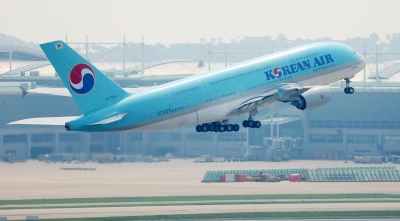Antitrust regulator rejects Korean Air-Asiana mileage integration proposal
By IANS | Updated: June 12, 2025 11:13 IST2025-06-12T11:06:07+5:302025-06-12T11:13:32+5:30
Seoul, June 12 South Korea's antitrust regulator said on Thursday that it has rejected a proposed mileage integration ...

Antitrust regulator rejects Korean Air-Asiana mileage integration proposal
Seoul, June 12 South Korea's antitrust regulator said on Thursday that it has rejected a proposed mileage integration plan submitted by Korean Air Lines and Asiana Airlines, citing insufficient details and consumer benefit concerns.
The Fair Trade Commission (FTC) said the plan, submitted earlier in the day as part of the carriers' broader merger plan, failed to meet the standards necessary to proceed with a formal review, reports Yonhap news agency.
"There were shortcomings in the proposed mileage redemption plan compared to what Asiana Airlines previously offered," the FTC said. "In terms of the proposed mileage integration ratio and other explanations, we found the submission insufficient to initiate a full assessment."
The FTC requested Korean Air to immediately revise and supplement the proposal before resubmitting.
In November 2020, Korean Air signed a deal to acquire a controlling stake in Asiana Airlines, aiming to form the world's 10th-largest airline by fleet size.
The nation's two full-service carriers account for a combined 40 percent of passenger and cargo slots at Incheon International Airport, South Korea's main gateway.
In April, Korean Air Lines, South Korea's leading air carrier, said it plans to invest 1.2 trillion won ($844.3 million) to establish a next-generation aviation research and training hub in Bucheon, west of Seoul.
The company plans to break ground on the 65,800 square-meter facility in 2027, with the opening planned for 2030. It will house more than 1,000 personnel, including researchers and flight instructors, and integrate a drone research centre, a flight training centre and a safety experience facility.
Korean Air said the facility reflects its long-term vision to lead the future of aviation through advanced technologies, pilot training and sustainable practices. The flight training centre, in particular, will consolidate Korean Air and Asiana Airlines Inc.'s training operations to enable the annual training of up to 21,600 pilots.
Disclaimer: This post has been auto-published from an agency feed without any modifications to the text and has not been reviewed by an editor
Open in app